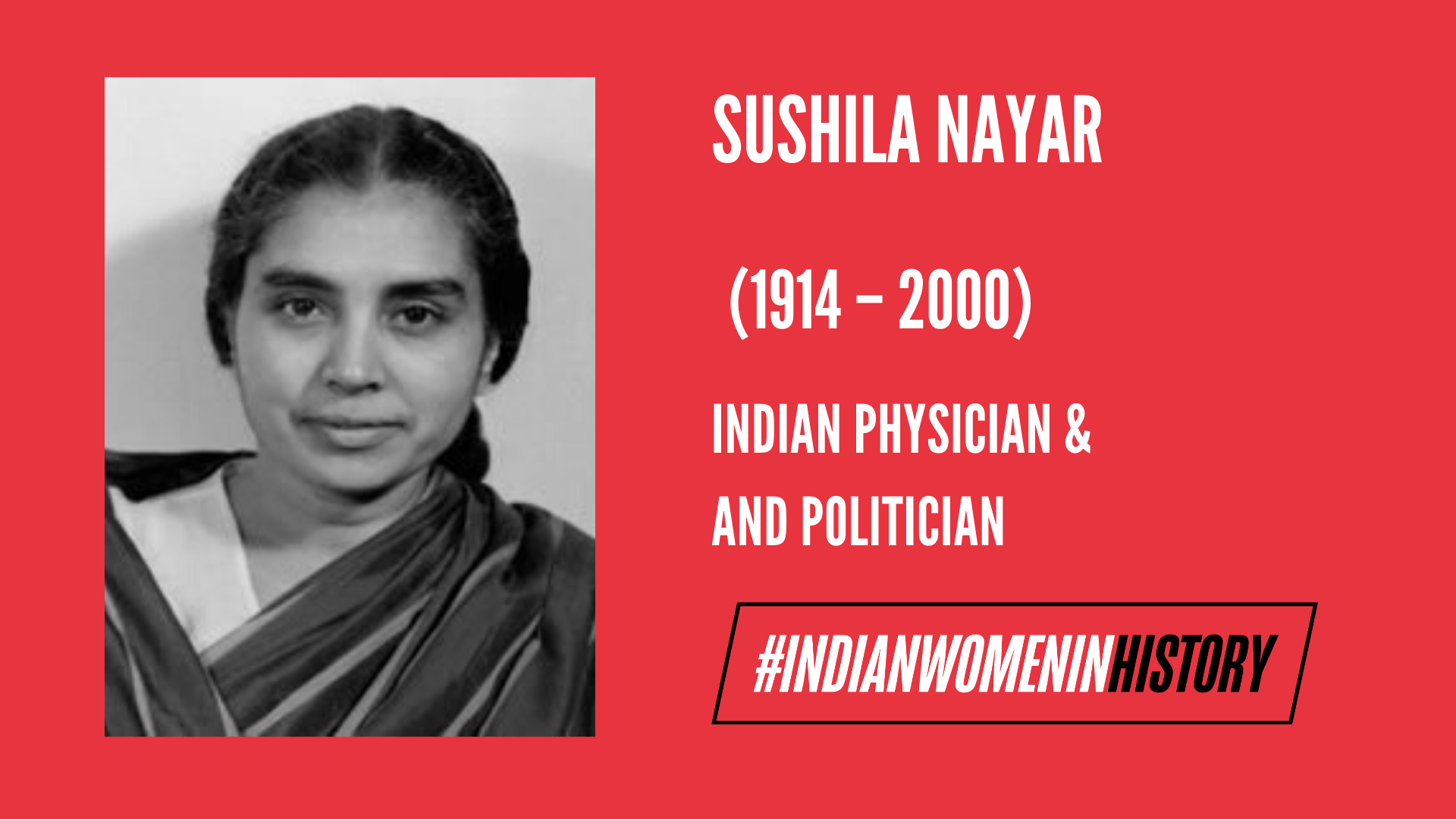Dr Sushila Nayar was a central figure in the development of health care programs and educational institutes in India for more than 40 years. Born in 1914, she was a close associate and personal physician of Mahatma Gandhi. She studied at Lady Harding College, Delhi, and Johns Hopkins University, USA. She was inspired by Gandhi’s ideas and work from a young age.
After Gandhi’s assassination in 1948, Dr. Nayar undertook the herculean task of maintaining his records. She remained unmarried throughout her life and engaged herself by translating Gandhi’s ideas and ideals into reality. She also worked tirelessly to bring peace and communal harmony during the turbulent period of the partition of the country.
Post-Independence
After independence, Sushila Nayar entered the political arena. She was a member of the Delhi Legislative Assembly (1952–1956) and the Minister for Health, Rehabilitation and Transport and Charitable Endowments, Delhi State (1952–55) and the Speaker of the Delhi Legislative Assembly (1955–56). Following the path of India’s first health minister, Rajkumari Amrit Kaur, Sushila became the first female health minister of Delhi state in Nehru’s cabinet and served until 1955.
She started and nurtured Kasturba Health Society and put her energy in developing the Mahatma Gandhi Institute of Medical Sciences (MGIMS) set up by her at Sevagram in 1969 and continued as its founder-director till the end of her life. She was also Chairman of the Kasturba Gandhi National Memorial Trust and the Chancellor of Gujarat Vidyapith, a University established by Gandhi.
In 1975, she opposed the imposition of the Emergency by the then Prime Minister Indira Gandhi and subsequently joined the opposition party (the Janata party) in protest. She fought and won the election to the Lok Sabha (lower house of the Parliament) in 1977. Thereafter, she retired from active politics and devoted her time for the betterment of society.
Sushila Nayar wrote several books in her lifetime, some of which have received acclaim. “Bapu ki Karavas Kahani” (received Presidential Award in 1952), “Hamari Ba” (1948) and “Kasturba, wife of Mahatma Gandhi” (1960) are but a few of her works. Her elder brother, Pyarelal, took it upon himself to write volumes on Gandhi but could complete only three. On his passing away, Dr. Sushila Nayar completed the remaining five volumes (IV, V, VI, VII and VIII).
Dr. Nayar also received a number of awards, prominent among which are: “Desikottam” by Vishwa Bharati University, Shantiniketan in 1995; The“Amol Prabha Das Award” by the Government of Assam in 1996; The “Ba and Bapu” Award by Ba-Bapu Samiti, Pune, in 1997; and “Public Health Person of the Millennium Award” in 2000.
Gandhian Living
As a medical professional, astute politician, and independent woman, Dr. Sushila Nayar’s life is an ode to the eternal values of social justice and empowerment. She was committed to rural healthcare development, eradicating illiteracy (particularly in women) and aiding those affected with leprosy. It is said that she influenced all those who she came in close touch with her and its no surprise why. Beyond politics and social reform, Dr. Nayar, strongly influenced by Gandhi, also paid strict adherence to the principles of ahimsa or non-violence and satyagraha (a form of political resistance) in her life.
To her, Dharma meant “right living, right thinking, and right action”. And while all of these ‘rights’ were a part of Dharma, Dharma, to Dr. Nayar was still “much wider than duty”. Through her actions and sacrifices, one sees both the truth and depth in both her values and vision for this country. In today’s era of hyper-consumerism, post-capitalism and ultra individualism, one realizes how far away we have strayed from Dr. Nayar’s (and Gandhi’s) dream of an India predicated on the ideal ‘swaraj’.
References
2. Sushila Nayar, MBBS, DrPH, MPH
3. Understanding Gandhi: Gandhians in Conversation with Fred J Blum
4. International Journal of Leprosy and Other Mycobacterial Diseases
Featured Image Source: Wikipedia
About the author(s)
Kanav is a postgraduate from Azim Premji University, Bangalore. He identifies as queer for personal and political reasons. All views are personal.





I expected more about her rich contribution to public health as a health minister as well as founder member of health institutions.